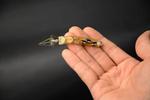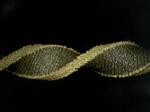Other

“Optical frequency comb offers a convenient way to generate elusive terahertz frequencies Optical frequency combs are widely-used, high-precision tools for measuring and detecting different frequencies — a.k.a. colors — of light. Unlike conventional lasers, which emit a single frequency, these …

“Researchers directly observe infinitely long wavelengths for the first time In 2015, researchers at the Harvard John A. Paulson School of Engineering and Applied Sciences (SEAS) developed the first on-chip metamaterial with a refractive index of zero, meaning that the …

“New method combines precision printing of stretchable conductive inks with pick-and-place of electronic components to make flexible, wearable sensors Human skin must flex and stretch to accommodate the body’s every move. Anything worn tight on the body must also …

“Imagine a tire that could heal after being punctured or a rubber band that never snapped. Researchers from the Harvard John A. Paulson School of Engineering and Applied Sciences (SEAS) have developed a new type of rubber that is as …

“While solar cells generate just 1 percent of the world’s electricity today, the International Energy Agency estimates that photovoltaic use will grow by 33 percent annually and, by 2050, solar energy could meet 16 percent of global electricity demand …

“Flexible endoscopes can snake through narrow passages to treat difficult to reach areas of the body. However, once they arrive at their target, these devices rely on rigid surgical tools to manipulate or remove tissue. These tools offer surgeons reduced …

“The traditional Japanese art of origami transforms a simple sheet of paper into complex, three-dimensional shapes through a very specific pattern of folds, creases, and crimps. Folding robots based on that principle have emerged as an exciting new frontier of …

“Researchers use expensive machinery to develop ways to harness DNA as a synthetic raw material to store large amounts of digital information outside of living cells. But what if they could coerce living cells, such as large populations of bacteria …

“Wearable technologies – from heart rate monitors to virtual reality headsets – are exploding in popularity in both the consumer and research spaces, but most of the electronic sensors that detect and transmit data from wearables are made of hard, inflexible materials …

“Did our Sun have a twin when it was born 4.5 billion years ago? Almost certainly yes — though not an identical twin. And so did every other Sun-like star in the universe, according to a new analysis by a …
